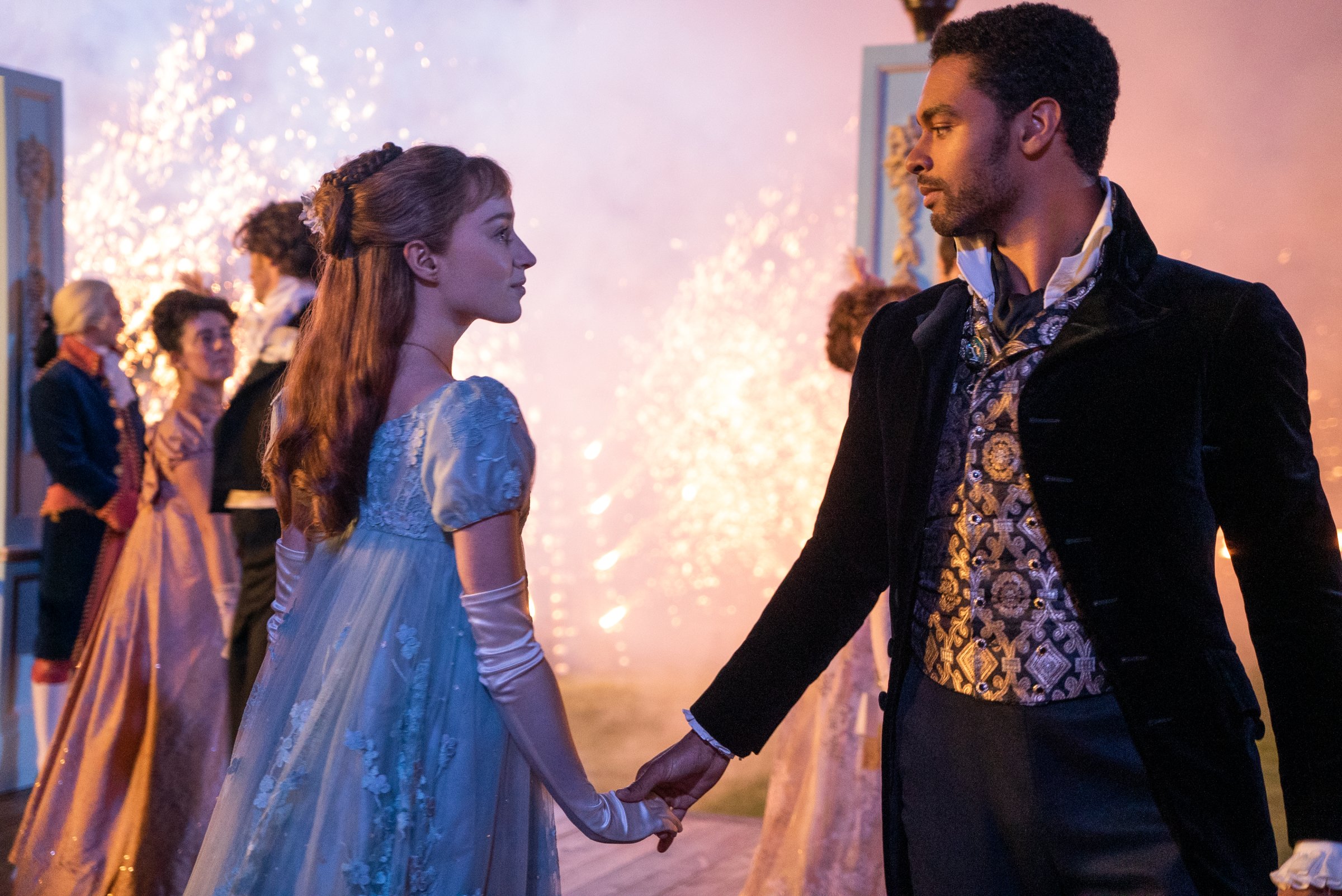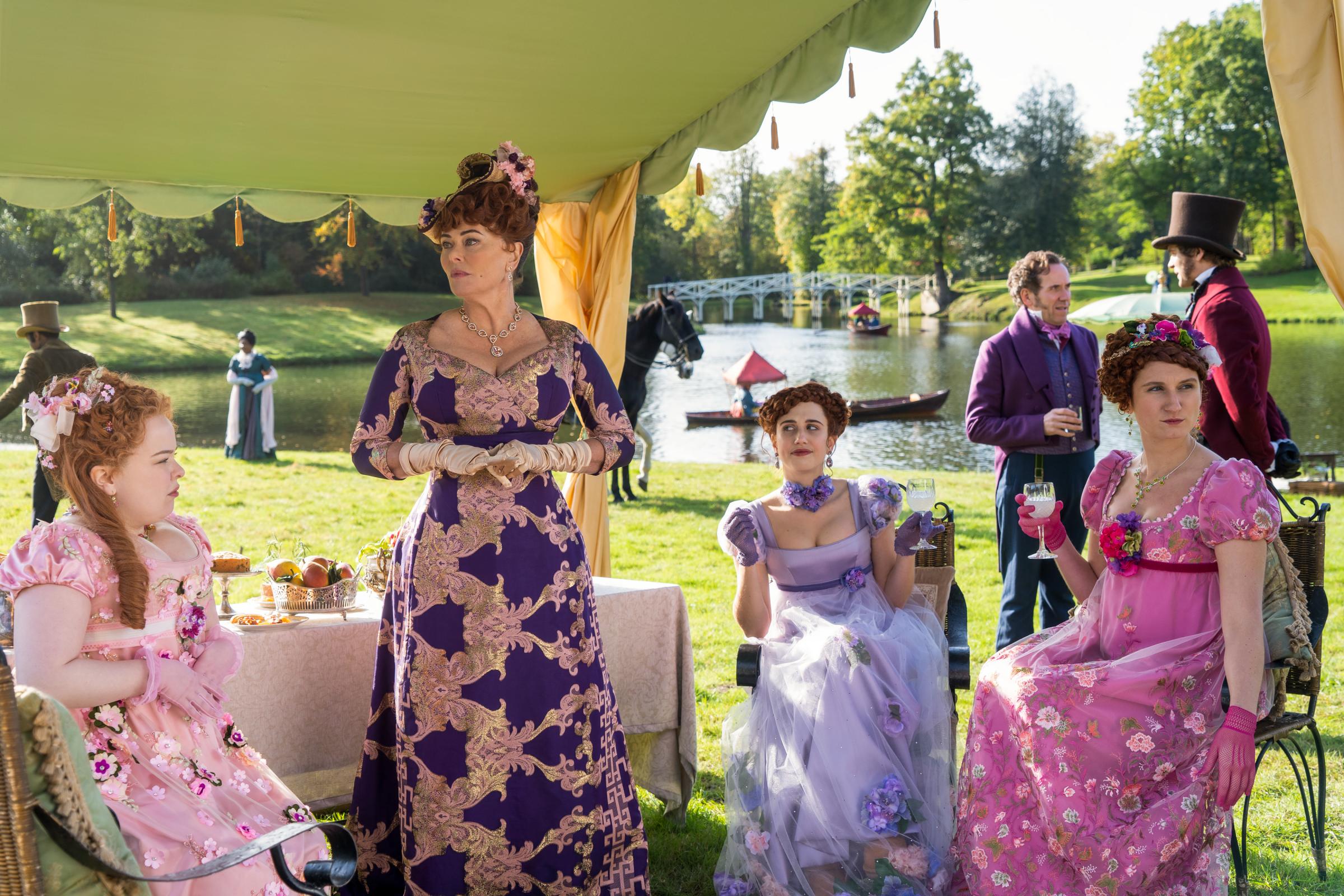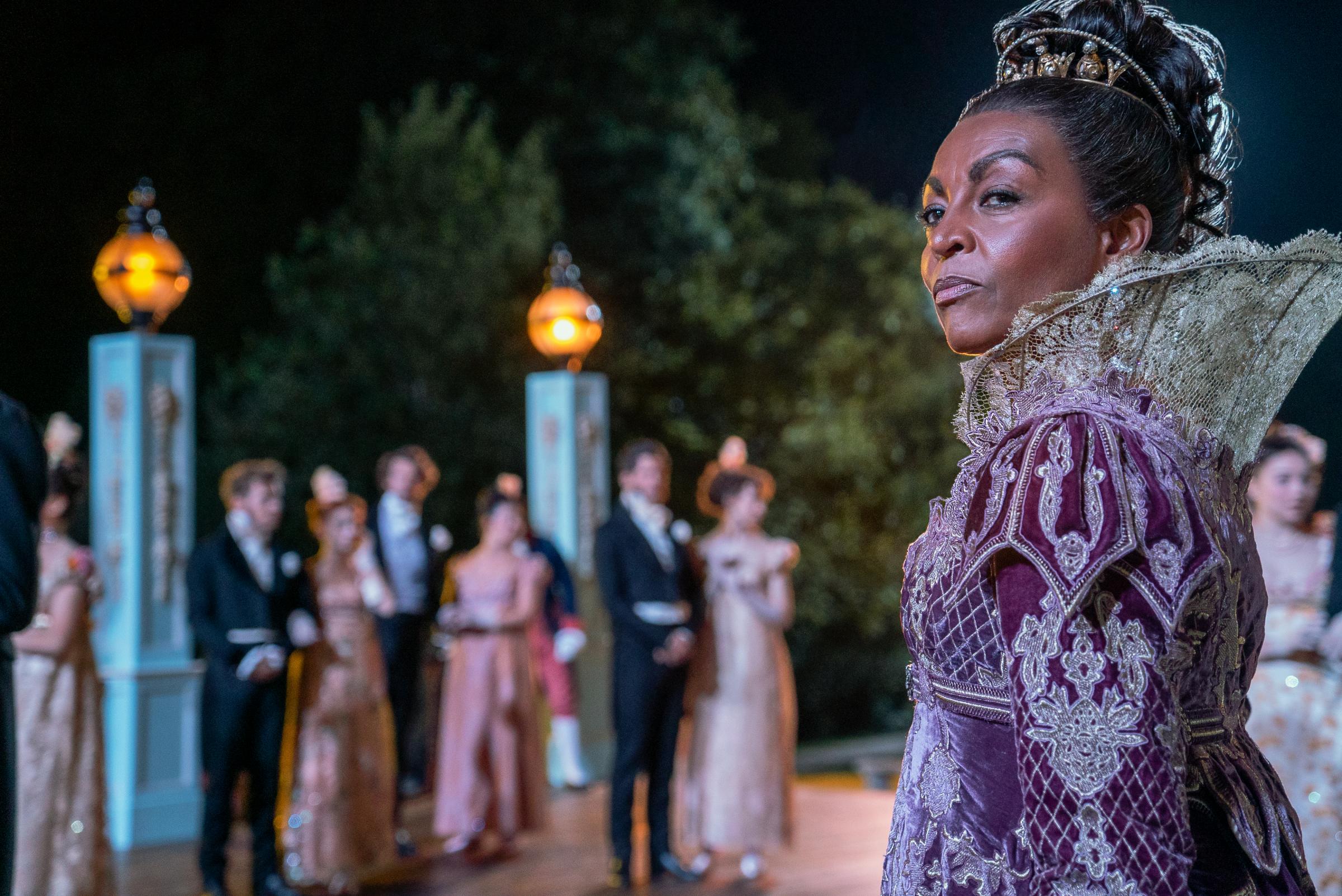
Rarely has the line separating love from hate been so thin as it is in 19th-century novels, between willful young women and the curmudgeonly men who, after a few hundred pages of bickering, come to adore them. Jane Eyre, Elizabeth Bennet, Jo March—they all clashed with their future husbands at first. And though the rigid courting rituals of the time have mostly faded into obsolescence, Anglophone pop culture retains its ravenous appetite for such pairings. Hence Austenmania, Downton Abbey and, most recently, the BBC postcolonial-India period drama A Suitable Boy, not to mention contemporary romance plots from Gilmore Girls to Twilight.
The tradition continues in Bridgerton, a lavish, Regency-era spectacle from the venerable executive producer Shonda Rhimes that will tumble down Netflix subscribers’ digital chimneys on Christmas. Strangely, the show left me feeling a bit like Mr. Darcy on Opposite Day. For the first half of the season, I loved it enough to marry it. Then… well, hate is a strong word. Let’s say I was seized by the apprehension that Bridgerton wasn’t quite the same show I’d so hastily committed to.
Adapted from Julia Quinn’s best-selling novels, it opens on the eve of the 1813 London social season. Our hero is Daphne Bridgerton (Phoebe Dynevor of Younger, equal parts sharp and winsome), the eldest daughter in a large, noble family and the pride of her widowed mother, the devoted Lady Violet (Ruth Gemmell, refreshingly understated amid many big performances). Violet married well but also for love, and her firstborn dreams of doing the same. The odds look to be in Daphne’s favor after an auspicious twirl in front of Queen Charlotte (Golda Rosheuvel), who deems her “flawless,” and subsequent co-sign in a mysterious new society-gossip rag credited to one Lady Whistledown (voiced by Julie Andrews, who doubles as the series’ narrator).

Too bad her older brother Anthony (Jonathan Bailey), Bridgerton’s heir, has to get in the way, convinced that none of her potential suitors are good enough—or financially solvent enough—for Daphne. Soon, the only nobleman he hasn’t scared off is the boorish Nigel Berbrooke (Jamie Beamish), and an unwanted proposal seems imminent. If only Anthony’s dear friend Simon, a.k.a. the rich, moody, arrogant, smoldering-hot Duke of Hastings (Regé-Jean Page of Roots, who seems destined for a future Sexiest Man Alive list), had any intention of marrying. But hey, that’s not a problem for Daphne. She calls Simon a rake, to his face, at a dinner devised to bring them together. Despite obvious chemistry, she certainly isn’t attracted to him. No, really, not even a little bit, why do you ask? So when the two cook up a fake courtship to get Simon’s marriage-minded aunt (Adjoa Andoh) off his case and exploit men’s competitive instincts in order to get Daphne some new suitors, what could possibly go wrong?
As this familiar but initially addictive story line plays out, creator Chris Van Dusen (a Shondaland staple since the early seasons of Grey’s Anatomy) introduces the Bridgertons’ neighbors, the Featheringtons. Dressed like Cinderella’s wicked stepmother on a Palm Beach vacation—and adamant that her daughters look equally ridiculous—the tasteless Lady Portia Featherington (Polly Walker) pushes all three of her girls into the marriage market at once, over protests from bookish Penelope (Derry Girls’ wonderful Nicola Coughlan), whose taller, slimmer sisters pick on her appearance. While none of the Featheringtons compare to Daphne, the family’s beautiful new ward Marina Thompson (Ruby Barker) makes quite the impression. But she’s got secrets, as do Anthony and Simon and just about every other character who isn’t the unnervingly wholesome Daphne. Plus, no one can figure out who this spookily omniscient Lady Whistledown really is.
If it all sounds like Jane Austen meets Gossip Girl meets PBS’s Masterpiece, that’s because it is—at first. True to Rhimes’ sensibility—one that’s as evident in Bridgerton as it was in her quintessential creation Scandal—emotional, fast-paced storytelling seems a bigger priority than historical accuracy, though the show doesn’t revel in anachronism like Hulu’s The Great or Apple’s Dickinson. The production design, from Will Hughes-Jones (The Spanish Princess), is exquisite: an opera-house interior is swaddled in velvet drapes and heavy fringe. Every ball (there are eight) takes place in a paradise of its own; packed dance floors sparkle with crystal chandeliers and fresh flowers, while an outdoor celebration awes guests with a canopy of primitive electric lights. Each Empire-waist frock is art, though the corset beneath it might draw blood. The dialogue is snappy and the mutual desire Dynevor and Page conjure so vivid, it almost hurts to watch.

The trouble comes midway through, when conflicts within several characters’ relationships begin cycling into redundancy and four episodes’ worth of chaste sexual tension give way to a fleshy, soft-focus aesthetic that perhaps owes more to Skinemax than it does to, say, the far more enticing Outlander. (Don’t let the Dec. 25 release date fool you: a family binge session might get pretty awkward. “We’re not making your grandmother’s period show,” Van Dusen has said, and, well, that’s for sure.) This shift in tone has all the subtlety of the Kool-Aid Man bursting through a brick wall. It’s true that there is a solid thematic reason for the abruptness (unfortunately, it’s a spoiler). Some of Bridgerton’s sharpest, most original moments come when it’s illuminating the consequences of the vast disparities in worldliness separating cosseted debutantes from the men they marry. Yet the attempts at 200-year-old dirty talk aren’t sexy so much as vicariously embarrassing. And there’s no stopping the descent into absurdity once the—how to put this delicately?—physical details of human reproduction start to dominate the plot.
It’s at this point that so many other weaknesses that are easy to ignore in the beginning, become impossible to overlook. Intriguing characters like Daphne’s younger sister Eloise (Claudia Jessie of ITV’s 2018 Vanity Fair miniseries, in a charismatic turn as a free-thinking girl detective hot on Lady Whistledown’s trail) never get fully developed. Marina is such a cipher and Penelope such a typical ugly duckling that when a rivalry emerges between them, so do some nasty tropes about young women and love. One of the best things about Bridgerton is its inclusive casting, which integrates people of color into all strata of 19th-century British society. But instead of letting superb performances by Page, Rosheuvel and Andoh, among others, speak for themselves, the show offers an alternate-history explanation so vague, belated and ambiguous in its relationship to actual history, it only creates plot holes.
Bridgerton is the first series to come out of Rhimes’ paradigm-shifting $100 million 2017 Netflix deal, and its elaborate scale reflects how much time and attention to visual detail her and Van Dusen’s team put into it. I suspect, too, that—like most of Rhimes’ fellow mega-producer Ryan Murphy’s Netflix output to date—it’s destined to be much more popular with viewers than with critics. It’s a fun show, for a while at least; the escapism quotient is high, especially at the end of a year without parties or gowns or skin-to-skin contact between people who don’t already share a bathroom. And it’s exciting to see Shondaland, which spent so many years chronicling the adventures of 21st-century professional superwomen, play around in a genre where feminist empowerment is harder to come by. If only the writing matched the production values. But Rhimes has certainly brought shows back from the brink before—and so, like a lovely debutante who overplays her hand, Bridgerton merits another season on the social calendar.
More Must-Reads from TIME
- Cybersecurity Experts Are Sounding the Alarm on DOGE
- Meet the 2025 Women of the Year
- The Harsh Truth About Disability Inclusion
- Why Do More Young Adults Have Cancer?
- Colman Domingo Leads With Radical Love
- How to Get Better at Doing Things Alone
- Michelle Zauner Stares Down the Darkness
Contact us at letters@time.com